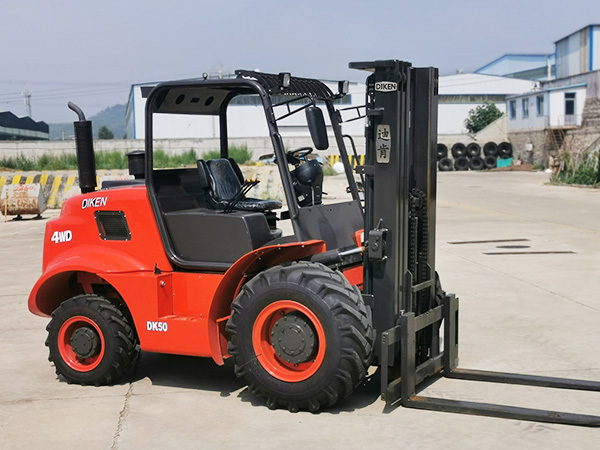Diken news
Five Key Industries That Can Benefit from Off Road Forklifts: Unlocking Efficiency in Challenging Terrain
Release time: 2025-08-03
Five Key Industries That Can Benefit from Off Road Forklifts
Off-road forklifts have become indispensable in various industries where traditional forklifts struggle. These robust machines are designed to navigate rugged terrains, offering unparalleled efficiency and versatility. In this article, we will explore five key industries that can significantly benefit from the use of off-road forklifts, highlighting their advantages and applications.
Table of Contents
1. Agriculture: Enhancing Productivity on Uneven Terrain
2. Construction: Streamlining Operations in Challenging Environments
3. Landscaping: Improving Efficiency for Landscape Professionals
4. Forestry: Navigating Dense Woodlands with Ease
5. Mining: Enhancing Material Handling in Harsh Conditions
6. Conclusion: The Future of Off-Road Forklifts in Diverse Industries
7. FAQs
Agriculture: Enhancing Productivity on Uneven Terrain
In the agricultural sector, off-road forklifts are a game-changer. **Farmers** often face unpredictable terrain, from muddy fields to steep hillsides, making traditional forklifts unsuitable. Off-road forklifts are designed with larger tires and enhanced traction, allowing them to operate efficiently in these challenging conditions.
**Key Benefits for Agriculture:**
- **Increased Mobility:** Off-road forklifts can traverse rough landscapes, enabling farmers to transport goods quickly and efficiently.
- **Versatility in Operations:** These forklifts can handle various attachments, such as bale spears and pallet forks, allowing farmers to adapt to multiple tasks.
- **Reduced Downtime:** The ability to operate in adverse weather conditions means that farmers can maintain productivity, regardless of the season.
Construction: Streamlining Operations in Challenging Environments
The construction industry often requires heavy lifting and material handling in tough terrains. Off-road forklifts are designed to tackle these challenges head-on. From building sites in remote locations to outdoor warehouses, these machines bring efficiency and safety to every project.
**Key Advantages for Construction:**
- **Superior Lift Capabilities:** Off-road forklifts can handle heavy loads, making them ideal for transporting construction materials like steel beams and concrete blocks.
- **Enhanced Stability:** Their design allows for better stability on uneven ground, reducing the risk of accidents or tipping.
- **Adaptability to Site Conditions:** Off-road forklifts can easily navigate construction sites, whether on gravel, mud, or sand, ensuring that materials are delivered where needed without delay.
Landscaping: Improving Efficiency for Landscape Professionals
For landscaping professionals, the ability to move materials swiftly and safely is paramount. Off-road forklifts offer the necessary adaptability for transporting soil, rocks, and plants across varied terrains.
**Benefits for Landscaping:**
- **Efficient Material Handling:** Off-road forklifts allow landscapers to quickly transport heavy loads across uneven surfaces, increasing operational efficiency.
- **Improved Access:** These forklifts can navigate through tight spaces and rough landscapes, making them ideal for residential and commercial landscaping projects.
- **Terrain Adaptability:** Whether it’s a sloped garden or a rocky terrain, off-road forklifts can handle it all, minimizing wear and tear on equipment.
Forestry: Navigating Dense Woodlands with Ease
The forestry industry demands robust equipment capable of maneuvering through dense woods and rugged terrain. Off-road forklifts meet these requirements, providing a reliable solution for lumber transport and material handling.
**Key Benefits for Forestry:**
- **Rugged Design:** Off-road forklifts are built to withstand the harsh conditions of forests, which often include mud, debris, and steep inclines.
- **Improved Load Handling:** They can efficiently move logs and other heavy materials from remote locations to processing sites, enhancing productivity.
- **Safety Features:** Many off-road forklifts come equipped with safety features designed for rough terrain, reducing the likelihood of accidents in challenging environments.
Mining: Enhancing Material Handling in Harsh Conditions
In the mining sector, off-road forklifts play a critical role in transporting materials between sites. The ability to operate in rocky and uneven terrain is essential for efficient mining operations.
**Advantages for Mining:**
- **Durability Under Pressure:** Off-road forklifts are engineered to withstand the rigors of mining environments, ensuring long-lasting performance.
- **Effective Material Transport:** These machines can quickly transport mined materials to processing areas, reducing delays and improving operational efficiency.
- **Operational Flexibility:** Their ability to navigate challenging terrains means that mining companies can maintain productivity, even in the most difficult conditions.
Conclusion: The Future of Off-Road Forklifts in Diverse Industries
Off-road forklifts are revolutionizing how industries operate in challenging terrains. From agriculture to mining, their versatility, durability, and efficiency make them an invaluable asset. As businesses increasingly seek ways to enhance productivity and safety, the adoption of off-road forklifts will likely continue to grow.
Investing in off-road forklifts is not just about improving operations; it’s about future-proofing your business against the challenges posed by difficult environments. By embracing these powerful machines, industries can unlock new levels of efficiency and safety.
Frequently Asked Questions (FAQs)
1. What are off-road forklifts used for?
Off-road forklifts are primarily used for transporting heavy materials across rugged and uneven terrains. They are ideal for industries like agriculture, construction, landscaping, forestry, and mining.
2. How do off-road forklifts differ from traditional forklifts?
Off-road forklifts are designed with larger tires, enhanced traction, and a rugged build, enabling them to operate efficiently on uneven ground. Traditional forklifts typically perform better on flat, stable surfaces.
3. Are off-road forklifts safe to operate?
Yes, off-road forklifts come equipped with safety features tailored for rough terrains. However, as with any heavy machinery, operators should be trained and follow safety protocols.
4. Can off-road forklifts handle heavy loads?
Absolutely. Off-road forklifts are engineered to lift and transport heavy loads, making them suitable for handling materials in demanding environments.
5. What maintenance is required for off-road forklifts?
Regular maintenance includes checking tire pressure, inspecting hydraulic systems, and ensuring all safety features are functional. Following the manufacturer’s maintenance schedule is essential for optimal performance.
Off-road forklifts represent a significant advancement in material handling capabilities across various industries. By understanding their advantages and applications, businesses can make informed decisions that enhance operational efficiency and safety.
Keywords: off road forklift









